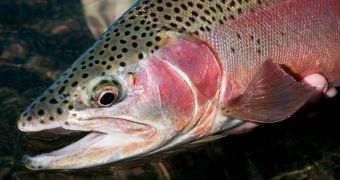A team of scientists claim to have directly linked climate change and biodiversity loss for the first time ever. Specifically, they say they found evidence that climate change fosters cross-breeding between native and invasive species inhabiting a given region.
According to Click Green, this link between climate change and biodiversity loss was proven with the help of information collected while monitoring trout in the Flathead River system.
Thus, it appears that an increase in the temperature of streams in said system coupled with a decrease in spring flow have ignited a romance between the native west-slope cutthroat trout and the introduced rainbow trout.
“Climatic changes are threatening highly prized native trout as introduced rainbow trout continue to expand their range and hybridize with native populations through climate-induced ‘windows of opportunity,’ putting many populations and species at greater risk than previously thought.”
“The study illustrates that protecting genetic integrity and diversity of native species will be incredibly challenging when species are threatened with climate-induced invasive hybridization,” argues specialist Clint Muhlfeld with the United States Geological Survey.
The scientists behind this research project claim that, according to evidence at hand, native west-slope cutthroat trout and introduced rainbow trout first started playing Romeo and Juliet several decades ago.
However, it was about 30 years ago that things took a turn for the worse, and hybridization began to spread upstream at a fairly rapid pace. It is estimated that, for the time being, genetically pure west-slope trout only occupy 10% of their historical range.
Specialists warn that, although having one fish species breed with another might not sound like such a big deal, the problem is that the resulting offspring might have trouble surviving, more so given the fact that climate change and global warming are reshaping natural ecosystems.
In their paper in the journal Nature Climate Change, the scientists further stress that, all things considered, it is possible that said phenomena will soon cause – or maybe are already causing – several other species to interbreed. In time, this could spell decreased biodiversity.
Commenting on the outcome of this investigation into how climate change influences animal behavior and can consequently reshape natural ecosystems as we know them, Ryan Kovach with the University of Montana in the US has stated as follows:
“The evolutionary consequences of climate change are one of our greatest areas of uncertainty because empirical data addressing this issue are extraordinarily rare; this study is a tremendous step forward in our understanding of how climate change can influence evolutionary process and ultimately species biodiversity.”

 14 DAY TRIAL //
14 DAY TRIAL //